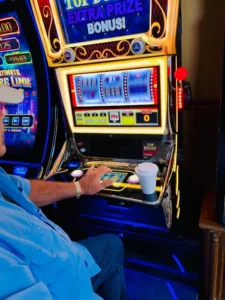
Responsible gambling is no longer a footnote in the casino industry, it’s central to how modern venues operate. Today’s gaming environments are designed not just for entertainment, but also for safety, transparency, and long-term trust. A range of tools and protocols have been introduced across South African casinos to support player wellbeing without compromising the thrill of the experience. This article explores the most effective responsible gambling tools currently in use and how they function within regulated environments.
One of the most effective tools integrated into Electronic Bingo Terminals (EBTs) and digital platforms is the reality-check notification. These are automated reminders that appear on-screen after a specific duration of continuous play. They inform the player how long they have been active and encourage them to take a break or reflect on their session.
Reality checks are not intrusive, but rather serve as a pause to encourage decision-making grounded in awareness. They’re customisable in many systems, allowing players to select how frequently they want to be reminded, ensuring the intervention is user-driven and respectful.
Deposit Limits and Pre-Commitment Tools
Setting financial boundaries is a crucial aspect of responsible gambling. Deposit limit tools allow players to set strict daily, weekly, or monthly limits on how much money they can deposit into their gaming accounts. Once a threshold is reached, the system automatically prevents further deposits until the next period begins.
This method encourages budgeting and helps prevent overspending. It offers players a practical way to manage their bankroll and introduces accountability without any manual monitoring. Increasingly, South African casinos are promoting these tools through apps and sign-up forms as part of their onboarding process. Self-exclusion is one of the most comprehensive responsible gambling tools available. This voluntary process allows individuals to restrict their access to gambling facilities for a set period, ranging from a few weeks to several years. Once a player enrols, the casino is obligated to deny entry, deactivate player cards, and block access to any digital services.
Casinos take self-exclusion seriously, often involving face-to-face consultations, support lines, and follow-up protocols. Staff are trained to manage these requests discreetly, ensuring the dignity and confidentiality of the individual. Many venues also share self-exclusion databases across sites to prevent circumvention. Shorter than self-exclusion, cool-off periods are intended for players who feel they need a temporary break without making a long-term commitment. These periods can be activated through in-person requests or app settings, and typically last anywhere from 24 hours to a few weeks.
During this time, players are unable to access gaming floors or digital services. This option is ideal for players who experience temporary emotional or financial stress and want to step back proactively. Some casinos provide support during this time in the form of wellness resources or optional return-checks before re-entry.
Loyalty Systems and Player Monitoring
 Modern loyalty systems are designed not only to reward players but also to monitor patterns of play that may indicate risk. When unusual activity is detected, such as extended hours of play or excessive spending, alerts can be triggered for intervention.
Modern loyalty systems are designed not only to reward players but also to monitor patterns of play that may indicate risk. When unusual activity is detected, such as extended hours of play or excessive spending, alerts can be triggered for intervention.
In many casinos, staff are notified discreetly and may engage with the player to offer support or suggest a break. This practice doesn’t infringe on privacy, as data is anonymised and used only to ensure responsible conduct. The goal is to offer early, non-confrontational assistance before patterns escalate.
The human component remains critical in responsible gambling. Staff at licensed casinos undergo regular training to identify early signs of gambling distress. These may include behavioural changes such as frustration, isolation, repeated ATM withdrawals, or visible agitation.
Team members are trained to approach players calmly and respectfully, often offering a beverage, a short conversation, or a referral to support services. The interaction is designed to be non-judgmental and professional, reinforcing the casino’s role as a responsible operator committed to guest wellbeing.
Effective responsible gambling tools are backed by regulatory compliance and audit trails. Licensed South African casinos must maintain detailed records of self-exclusion agreements, deposit limit settings, and intervention logs. These are subject to regular audits by provincial gambling boards and the National Gambling Board. Transparency in reporting not only ensures compliance but also builds trust with players. When tools are properly implemented, casinos are able to demonstrate their commitment to a safe and controlled gambling environment, reassuring players and regulators alike.
Mobile technology has enhanced the application of responsible gambling tools. Casino apps now allow players to manage their deposit limits, initiate cool-off periods, and receive real-time notifications of their session durations. Some even integrate biometric logins to ensure secure access to responsible gaming features.
These features empower players to self-regulate on their own terms, turning the digital device in their pocket into a tool for both entertainment and control. As a result, responsible gambling becomes an active part of the player experience, not just a passive afterthought.
Balancing Enjoyment with Safety
The purpose of responsible gambling tools is not to restrict play, but to keep it enjoyable, sustainable, and within safe limits. When implemented thoughtfully, these tools allow guests to manage their habits confidently, preventing harm while preserving the thrill and luxury that define a quality casino experience.
South Africa’s regulatory frameworks support a balanced approach to gambling, promoting personal responsibility while ensuring operators meet their obligations to protect patrons. The industry’s investment in technology, training, and transparent practices reflects a long-term commitment to ethical and responsible conduct.
Responsible gambling tools are most effective when they’re visible, accessible, and supported by both technology and human intervention. From on-screen reality checks and deposit limits to self-exclusion programmes and staff outreach, these mechanisms work best when integrated into the everyday operation of a casino.
For players, these tools are not restrictions, they’re resources. They create a structured environment where gambling remains fun, fair, and in control. As the South African gaming industry continues to evolve, the emphasis on responsible gambling is a clear sign of its maturity, professionalism, and respect for every guest who walks through the door.









